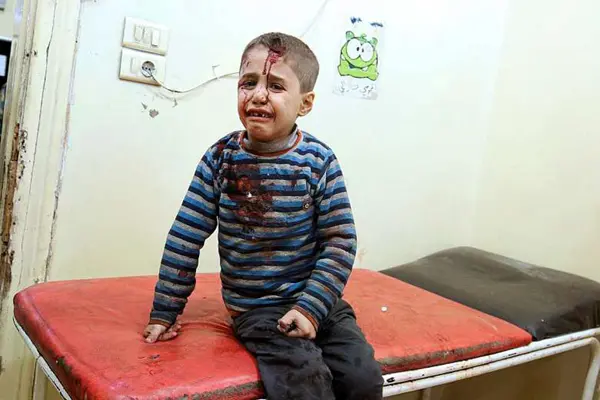All hospitals in Syria's besieged rebel-held eastern Aleppo are out of service after days of heavy air strikes, its health directorate and the World Health Organisation (WHO) said, though a war monitor said some were still functioning.
Ms Elizabeth Hoff, the WHO representative in Syria, said on Saturday that a UN-led group of aid agencies based over the border in Turkey "confirmed today that all hospitals in eastern Aleppo are out of service".
"This destruction of infrastructure essential to life leaves the besieged, resolute people, including all children and elderly men and women, without any health facilities offering life-saving treatment... leaving them to die," said Aleppo's health directorate in a statement sent to Reuters late on Friday by an opposition official.
The war monitor, the Britain-based Syrian Observatory for Human Rights, said 48 people, including at least five children, had been killed in eastern Aleppo on Saturday by dozens of air strikes and barrel bombs and dozens of artillery rounds.
There were intense clashes in the Bustan al-Basha district, it added.
The charity Doctors Without Borders said in a message there had been more than 30 hits on hospitals in eastern Aleppo since early July.The monitoring group said some hospitals were still operating in besieged parts of Aleppo but said many residents were frightened to use them because of the heavy shelling. Medical sources, residents and rebels in eastern Aleppo say hospitals have been damaged by air strikes and helicopter barrel bombs in recent days, including direct hits on the buildings.
White House national security adviser Susan Rice said the United States condemned "in the strongest terms" the latest air strikes against hospitals and urged Russia, an ally of Syrian President Bashar al-Assad, to take steps to halt the violence.
British Foreign Secretary Boris Johnson tweeted that reports of air strikes hitting civilians and hospitals in east Aleppo were "sickening" and called for a return to diplomacy.
Both Russia and Mr Assad's government have denied deliberately targeting hospitals and other civilian infrastructure during the war, which began in 2011 and was joined by Russia's air force in September last year.
Health and rescue workers have previously been able to bring damaged hospitals back into operation but a lack of supplies is making that harder.
Mr Staffan de Mistura, the special envoy of the UN secretary-general, was likely to meet Syrian Foreign Minister Walid al-Moalem in Damascus yesterday after recent talks in Turkey and Iran, one diplomat said.
"He will push on Aleppo, perhaps on a ceasefire, but on the political file there won't be anything until (UN Secretary-General Ban Ki Moon's successor Antonio) Guterres is in office," the diplomat said.
(THE STRAITS TIMES)
 简体中文
简体中文

